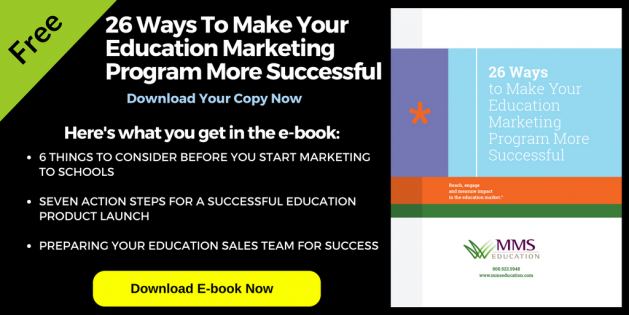Social media has become a part of our everyday lives, both personally and professionally, and educators are certainly no different.
You may have seen the studies that show educators are using social media to research classroom products, find lesson plans and free online resources, and solicit opinions and input from their colleagues.
So how exactly are educators using social media? And how does this factor into your efforts to reach them? Read on to hear our insights and recommendations.
Has anyone had success influencing educators through social media?
Yes! EdWeek Market Brief recently partnered with the Education Week Research Center to dive more deeply into the companies and organizations using social media to influence educators. Their results showed the top five influencers to be:
- Amazon Web Services
- Houghton Mifflin Harcourt
- Cengage Learning
- K12 Inc.
- WeAreTeachers, a property of MDR
While they’ve employed various tactics (we encourage you to go check them out!), they all share a key element to success through social media — they focus their strategies on engaging educators, not just sharing content and hoping it gets seen.
Engagement isn’t just a term in the wedding industry
If you’re attempting to make an impact through social media, then engagement is key. Maybe your audience is asking a question and you’re answering it. Maybe you’ve shared content and they’re responding with their own feedback. The key is to fully participate in those interactions. Keep them going to establish a relationship that can be returned to when you have a promotion to share or a new product to launch.
(Authenticity + relevancy) × empathy = social media success
You want to make your engagement with educators authentic and relevant. We all know someone who isn’t genuine in their conversations. Don’t be that person. What you share should always make sense and be pertinent to the topic at hand. Make an effort to understand the nuances of being an educator — understand the pressures, time constraints, challenges, and policies that educators face every day. This will allow you to empathize with them, gaining their trust along the way and opening an eventual door for you to share how your product or program can help them.
Save the trees . . . and your social media interactions
Double-sided is good not only in printing and saving paper, but also in conversations. Think of your social media interactions with educators in this way. By utilizing social media to have a conversation with your customers, you’re opening the door for them to share their questions, concerns, needs, and wants. Be sure to listen, and respond appropriately.
Ensure a well-rounded online presence
Access to social media allows educators to do their own homework when it comes to products and programs they may be interested in. If they’re following you on social media, they’ll most likely go there first to get their information. They’ll take note of product reviews, your response time to questions, your involvement with charities, employee recognition, anything and everything you post on social media—all of which can influence their decision-making process, regardless of how it relates to the actual product you’re selling. Don’t be afraid to share on social media, just be aware.
Instant gratification
The desire for instant gratification isn’t unique to educators, but is good to keep in mind. With social media being at our fingertips, there is an expectation of a quick response time. Make sure your social media channels are monitored frequently and ensure you have a team in place to do so. Seeing that a company is quick to respond and is gracious in doing so will go a long way toward developing trust.
Just like your average two-year old, educators can “do it myself!”
It goes without saying that educators are busy, and being barraged with unsolicited phone calls or emails doesn’t always make them feel warm and fuzzy. Educators tend to seek out information when they want and need it, and they’ll do so by searching hashtags or sending out tweets. After they do their research and gather feedback this way, they’re then prepared to pursue the products and programs they want.
Social media is just one tool in the toolbox
It can be easy to get sucked into the world of social media, but be careful not to neglect other marketing tools. Be sure to integrate your social media strategy into your overall marketing plan. Explore ways to tie your social media into existing email, direct mail, advertising, conferences, and other channels. The possibilities are endless.
Not sure how to approach social media to support your education program or product? Call MMS Education! MMS Education specializes in helping nonprofit organizations and corporate foundations reach, engage, and measure impact in the education market. Call us today at 866–382–6116 or fill out this form to see how MMS Education can help you.

